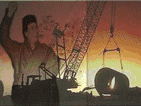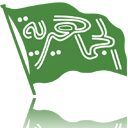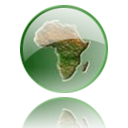Final Communiqué
of the Conference on " African Union " Organized Jointly by the
Word Center for Studies and Research of the Green Book And the
Africa Association of Political Science
PREAMBLE
We, the African
social scientists, who have gathered in the Great Jamahiriya in
collaboration with our brothers and sisters of the World Center for
Studies and Researches of the Green Book, exchanged views on issues
of African Unity and prosperity.
During a
three-day conference, we discussed issues on the following
themes:
Politics of
integration in Africa.
Economics of
integration in Africa.
Conflicts and
integration in Africa.
Role of
institutions and civil society in the African Union.
Legal and
constitutional Aspects of the African Union.
Presentations
on these themes provided a vibrant intellectual atmosphere which
enabled a rich exchange of views and experiences aimed at improving
the project of the African Union.
It was noted
during the discussions that Africa stands at a critical conjuncture
in the struggle for emancipation and freedom.
Forty years of
independence have had mixed results. Great victories have been
scored and recorded against imperialism, colonialism and
neo-colonialism. The struggle of the Libyan people and leader
Mummar Ghaddafi against the forces of exploitation and oppression,
for example, is a clear evidence of some of these
victories.
Nevertheless,
discussions at this conference revealed many problems, deficiencies
and shortcomings that still face the continent and continue to be a
hindrance to the accomplishment of the aspirations of the African
people.
The following
recommendations therefore reflect some of these difficulties and
are intended to assist the African Union in confronting these
problems.
RECOMMENDATIONS
The African
Union, while building upon the accomplishments of the OAU, must
strive to avoid its pitfalls and to transcend the limitations that
faced the Organization in the last forty years.
The building of
the African Union on the basis of the regional economic
communities, while positive in itself, must give way to political
unity in the regions rather than narrow economism.
While we
commend the founding fathers for having created an all inclusive
African Organization, there is a need to promote an African
consciousness built upon the diversity and richness of its
people.
It is also
recommended that more space for democratic participation should be
created and sustained on the basis of democratic constitutions in
order to put the African people at the center.
It was further
recommended that economic integration should be focused on
production in order to create an internally integrated
self-sustaining African economy.
While Africa
must deal with the challenges of globalization, this must be done
on the basis of Africa evolving an alternative model of
accumulation which aims at controlling and utilizing African
resources for the benefit of the African people.
It was also
recommended that innovative approaches must be adopted in
analyzing, preventing, managing and transforming African conflicts
on the basis of clearly identified root causes.
It was further
recommended that the people must be involved in all activities and
institutions of the African Union and must provide popular
foundation of the organization.
It was
recommended that the decisions and resolutions of the Economic and
Social Council should be given a greater weight than merely being
advisory.
It was also
recommended that the Pan-African Parliament should be based on
universal, popular suffrage.
It was finally
recommended that in order to draw upon and utilize the intellectual
resources of the continent, the African Union should strive to form
think-tanks in order to enhance its capacity for research and
analysis. >
Back to Top <
I am a text block. Click on me to drag me around or click a
corner handle to resize me. Click the settings icon (it's the left
one, looks like a cog) to change this text. You can type new text
into me or cut and paste text from somewhere else. Click outside of
me when you're done and any changes will be saved.





